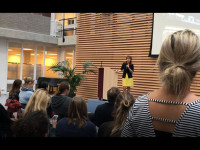During the kick-off on September 12th Joke Meijer was explaining how our biological clock controls 24-hour rhythms in our body and brain. When our clock is disrupted by for instance shift work, transatlantic flights or high age, our disrupted clock is causal factor for diseases like depression and cancer. The human clock is located at the base of the brain, and receives input directly from light sensors in the eye, keeping the clock, and consequently our body, on schedule. Morning light exposure is crucial for this, and directly affects the core molecular clock in our brain. Joke Meijer’s research group explores genes, nerve cells and cellular brain networks and develop strategies for improving clock function.
The LUMC is a unique national academic center for studying the role of our biological clocks in health and disease. For instance, Meijer developed the App ‘Goedenacht’, and the Endocrinology department developed ‘Keeping Fit through the Night’ to support medical workers in day and night shifts. However, not only staff, also patients can benefit from proper rhythms, which is currently investigated with neonatology and the intensive care units.
Meijer’s Neurophysiology research group works closely together with other LUMC departments like Genetics, Endocrinology, Oncology and Neurology, and not at least with the Instrumental Engineering department which is designing and manufacturing electronical and mechanical systems allowing for unique research.
The PEP-talk is a rapid 20 minutes lecture given during lunchtime, and open and free to all LUMC Patients and Personnel, visitors and students.
The powerpoint presentation can be found here.



